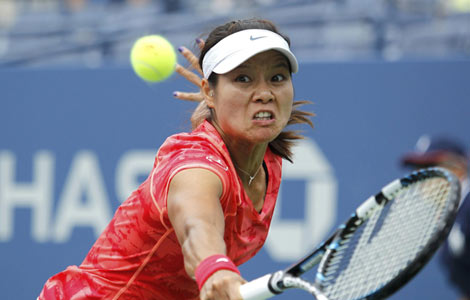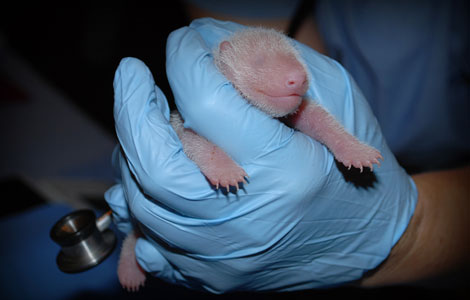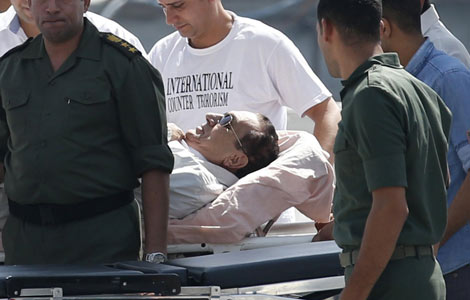Prosecutors seek heavy punishment for Bo Xilai
Updated: 2013-08-27 01:33
By AN BAIJIE and ZHAO YINAN (China Daily)
|
||||||||
Evidence 'authentic and sufficient, and facts are clear'
Prosecutors called on Monday for heavy punishment for former Chongqing Party chief Bo Xilai because of his lack of remorse, as the court completed the high-profile corruption trial.
Bo, 64, a former member of the Communist Party of China Central Committee Political Bureau, had stood trial since Thursday at the Jinan Intermediate People's Court for bribery, embezzlement and abuse of power. A verdict has not yet been issued.
Legal experts believe the case has marked a new start for judicial transparency in China, as much of the court transcript was posted online.
On Monday, the prosecutors accused Bo of having committed "extremely serious crimes" and refusing to confess. Bo denied all charges throughout the trial.
Prosecutors said Bo had admitted to some crimes when the case was being investigated, but in court he denied his previous testimony.
Bo responded by saying that the law guarantees his right to candidly give his opinion in court and prosecutors should not deem it as bad behavior.
Prosecutors said Bo's behavior in court does not merit any lenient punishment, and he must be strictly punished in accordance with the law.
During court debate on Monday morning, prosecutors claimed that the evidence to charge Bo with bribery, embezzlement and abuse of power is "authentic and sufficient", and that the facts are clear.
They allege he accepted 21.79 million yuan ($3.56 million) in bribes and embezzled 5 million yuan.
Bo insisted that he did not accept bribes from Tang Xiaolin, general manager of Dalian International Development and Xu Ming, chairman of Dalian Shide Group.
Bo admitted that he had helped Tang obtain preferential quotas to import cars and helped Xu work on petrochemical projects, but he claimed that he was doing so out of public duty rather than for private gain.
The prosecutors said Bo knew that his wife Bogu Kailai had accepted a French villa worth 2.32 million euros ($3.1 million) from Xu Ming, and Bogu Kailai's testimony presented at the court on Friday supported the accusation.
However, Bo argued that prosecutors could not find sufficient evidence to prove his knowledge of the villa and said his wife had kept secrets from him for 10 years.
The prosecutor said that Bo received about 4.43 million yuan from Xu Ming through his wife and son to pay for international and domestic air tickets, accommodation and traveling expenses, to pay off credit card debt and buy a Segway scooter.
Bo denied the accusation by saying that he had no time to pay attention to trivial issues such as airline tickets since he was working "like a machine" for the government.
The prosecutors said that Wang Zhenggang, then director of the Dalian bureau of urban and rural planning, remitted 5 million yuan of project funds to a bank account chosen by Bo's wife. The remittance was endorsed by Bo after Wang talked to him, the prosecutors quoted Wang's testimony as saying.
But Bo said that Wang had lied and his testimony contradicted that of Bogu Kailai in terms of where and how Wang gave her the money.
Bo also mentioned that his wife had an intimate relationship with Wang Lijun, former deputy mayor and police chief of Chongqing.
"They seemed to be glued to each other. Gu Kailai listened to whatever he said," Bo said, according to a transcript released by the court's micro blog.
Bo said after Bogu Kailai murdered British citizen Neil Heywood in November 2011, she immediately told Wang Lijun.
Bo said that once he even found Wang's shoes in his apartment and that he felt fed up with the "special relationship" between his wife and Wang.
Bo insisted that he knew nothing about the murder case until Jan 28, 2012, when Wang told him about it in his office.
Wang appeared in court on Saturday, testifying that Bo tried to cover up the murder case by physically attacking him in front of two other local officials to threaten them into silence.
Bo admitted on Monday that he was wrong to slap Wang, but he insisted that he did not abuse power to stop Wang from investigating the murder case.
"When I heard the case for the first time on Jan 28, I did not believe that she could kill people. I thought he framed Bogu Kailai, and I felt that he was of bad character," Bo said while explaining why he removed Wang from his post.
Bo said the five-day trial gave him and the prosecutors sufficient opportunity to express themselves.
Liu Yanjie, spokesman for the Jinan Intermediate People's Court, said the rights of Bo and his defense lawyers in the prosecution process have been ensured.
Trial transparency hailed
Bo's trial was held in the largest courtroom in the Jinan Intermediate People's Court, and more than 100 people, including many from the media, were present, Liu said.
"We will continue to carry out the principle of judicial transparency in future trials," he said.
He Jiahong, a law professor specializing in anti-graft studies at Renmin University of China, said the trial's transparency has exceeded his expectations.
"It shows the leadership's resolution and confidence to combat corruption and push forward with judicial justice," he said.
He followed the proceeding through the transcript, which was released on the court's micro blog.
He said he hopes all court hearings will be as transparent as Bo's.
You Wei, a law professor in job-related crimes at East China University of Political Science and Law, said he believes Bo's trial marks the start of judicial transparency in China.
He said it is still rare for courts to release court transcripts on micro blogs.

 Chinese navy starts escort mission at Gulf of Aden
Chinese navy starts escort mission at Gulf of Aden
 McGrady retires, considers career in China
McGrady retires, considers career in China
 Li Na breezes into US Open second round
Li Na breezes into US Open second round
 China and India set to resume military drills
China and India set to resume military drills
 Dwight Howard, Kai Ko promote fitness in Beijing
Dwight Howard, Kai Ko promote fitness in Beijing
 DC panda cub doing well
DC panda cub doing well
 Muslim Brotherhood leaders, Mubarak face trial
Muslim Brotherhood leaders, Mubarak face trial
 Cliff diving in the city
Cliff diving in the city
Most Viewed
Editor's Picks

|

|

|

|

|

|
Today's Top News
Asian interns in US politics on the rise
Epson to recall defective printers in China
Nation must adjust when US tapers QE
Prosecutors seek heavy punishment for Bo Xilai
Pet abuse videos prompt outrage
China joins world anti-tax fraud effort
UN to contact US over spying report
Foreigners nabbed for personal info trafficking
US Weekly

|

|







